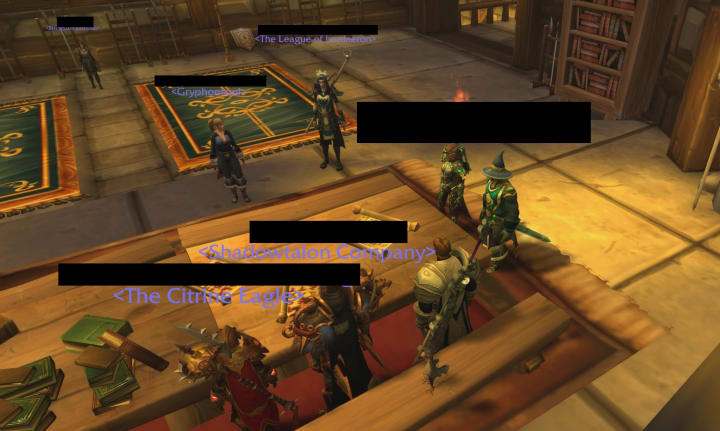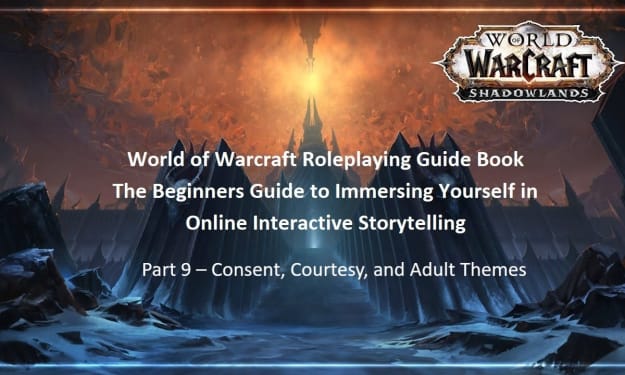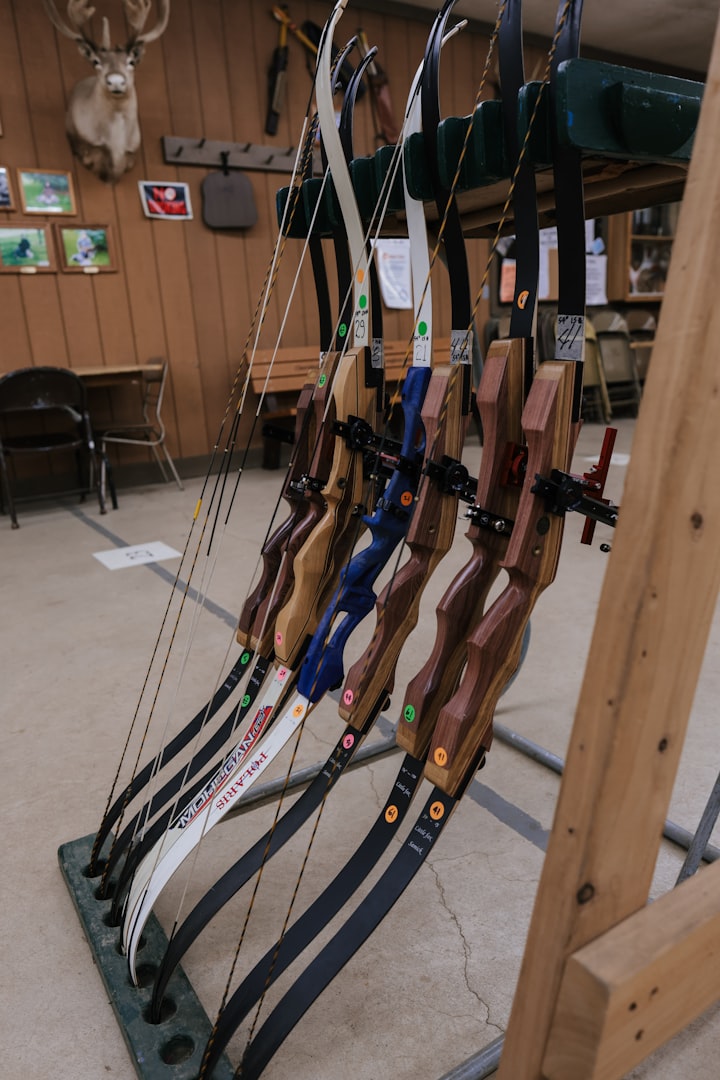Warcraft Roleplaying Guide: Addons - Arguments, Compromise, Resolutions.
The Beginners Guide to Immersing Yourself in Online Interactive Storytelling

Imagine this scenario: You joined a group of friends and decided that you guys want to meet up and Roleplay on the weekend as a band of adventurers exploring the world and getting into funny situations together. To all of you, this is a great way to both play the game, and roleplay as the characters you want to develop and can even have you earn rewards while doing so.
At first, it was pretty fun. You and your friends do old dungeons, raids, Quest area's and try to do group achievements together all while pretending you're a merry band of friends fresh out in the world.
Soon though, problems arise. Several people want to take the group in a different direction and do different things because they feel the Roleplay has gotten stale and they've explored every avenue of randomized adventure that they can handle.
Others though want to keep going, and want to do every single bit of content as that character to feel that they can justify their character's innate sense of wanderlust.
Both sides come with fair points and discuss it out. Opinions are said, weighed, and debated and tempers flare, cool, and flare again as they argue and debate on which direction they want to go.
Now, this can go one of two ways. A good way where everyone gets what they want, or a bad way where everyone gets mad, frustrated, and leaves and the group dissolves.
This section is entirely devoted to how you, as a beginner Roleplayer, can navigate the frustrating situation above with keeping your sanity, temper, friendships, and fun all intact.

First off, I want to state that this section will not be dealing with Drama and how to either avoid it or get rid of it. That comes at a later section of the Roleplaying Guide because I feel that it should be an entire section of its own since it encompasses a lot of various topics from dealing with trolls, to protecting yourself from malicious and harmful actions.
Instead, what I want this section to focus on is the HEALTHY portion of arguments and conflict. The type that we all face, but really isn't as bad as you think. The kind of arguments and conflict that make people stronger and healthier in their day to day social interactions. Sure, all of it is negative, but negative doesn't have to mean it's bad and you should avoid it completely; especially if you're able to turn it into a positive.
With that said, I'm going to go ahead and start us off first with Arguments, and the etiquette that most Roleplayers follow when it comes to Arguing. I feel that will serve as the basis for this entire section and show you that Arguing isn’t always so bad when you understand how to work with other people.
Arguments
Conflicts and arguments tend to happen, which is an unfortunate part of life that no one likes to deal with, even though it happens often enough that we should be used to it by now. Arguments can range from anything as simple as just a disagreement on the interpretation of lore, all the way up to heated debates on story direction and character development - or even anything else n between where a difference of opinion can occur.
As I stated in the introduction, I'm going to be discussing helpful Arguments, since I want to save the non-helpful and harmful style of arguing later on. For now, let's focus on constructive arguing and how you as a beginner Roleplayer need to learn to separate the two to have a healthy relationship with the community.
As I mentioned above, disagreements are actually perfectly ok. No one will ever have the same opinion on everything, and will rarely have two thoughts that are alike. Likewise, debate is great as well because it allows players a chance to be involved in discussions and developments by putting their opinions and thoughts into the process and having them engaged by other people.

In essence, Roleplay, Storylines, Events, and more are what fuel roleplay in general. Very rarely does collaborative work build off of one person's ideas and plans linearly. Not only that, but when arguing correctly and healthily, disagreements and arguments can lead to stronger bonds between people who take feedback and opinions and re-structure their own opinions, thoughts, and even character developments.
The problem arises though when people start to base their ego's on their opinions, which can and often do lead to the toxic sort of arguments that I'll get to later. This isn't necessarily BAD, because we should care about the things that we're passionate about, but heavy investment in ego and identity can potentially make you feel like you're being personally targeted.
Which leads to trouble down the line.
So then as a beginner to Roleplay, what do you do to keep yourselves from devolving arguments from the healthy kind into the unhealthy kind? Well, there are several ways that can help; let’s go over a few.
1) Realize that it's a skill to learn. Arguing, debating, compromise and everything else encompassed in this section is a skill that everyone needs to learn, not just Roleplayers. Remember Debate Club in school, or learning Rhetoric in any life skill class? Those are helpful for a lot of reasons for more than just making you feel embarrassed talking in front of a crowd. They teach you important skills in how to successfully explain your opinion, lay out logically the reasons for that opinion, and how to successfully listen to others and change your position when warranted. It's a skill that you can pick up for more than Roleplay purposes as well since it'll help you in almost every facet of life.
2) Separate your emotions from the argument itself. Though, admittedly this isn't the easiest thing that you can do depending on what the discussion is about. After all, no one sane would get mad if another person doesn't like the same flavor of cake as them, but they more than likely would be upset if they feel that the way a storyline or event is structured could box their characters into making a decision that they OOCly (Out of Character) don't want to make.
In essence: recognize that you shouldn't tie yourself emotionally into the argument; that way when you find that the discussion isn't going the way you want it to, you'll find yourself less likely getting upset and saying/doing something that you'll regret to a crowd of your peers.
Of course, that IS easier said than done, but it does tie up well to the first point I mentioned.
3) Learn when to walk away! This part is often hard for a lot of people, but recognize warning signs that you are being drawn into a heated position. Remember: There's nothing wrong with getting upset, but there’s a lot wrong with lashing out in anger at other people.
If you find yourself getting angry, upset, or uncomfortable with the direction of an argument it’s perfectly alright to let the others know you wish to pull back and leave the discussion or the topic. Other people, if they learned and developed proper rhetoric skills in argument and debate, will often be understanding and do what will help you feel comfortable.
Plus, etiquette wise, since everything we do is predominately written in text, you'll often find respect and praise coming your way because you're able to keep a cool head even in tense situations. People like others who recognize their own limitations.
Compromise
So now that you've navigated the pitfalls of keeping an argument healthy, what comes afterwards once everyone has said their part? Well, to most, what comes next is the step that attempts to make everyone happy: Compromise
What exactly is compromise then? Compromise is a tactic where everyone involved in the argument/debate have laid their thoughts and opinions on the table and the group tries to piece together every part of what was discussed into something coherent that the collective can be satisfied with. It's taking the things that are presented throwing some things out, potentially adding others, and modifying something via consensus.
You do it all the time even if you don't realize you are. It's something as simple as deciding what to eat for dinner with another person, or as complex as managing an organization and its message. Compromise is a part of daily human interaction - and in fact, you even can compromise with just yourself when you're presented with two different bits of information.
Now, how this fits in with this section exactly is that I'm going to demonstrate that Compromise is an argumentative tool that helps to stave off drama and make everyone feel happier when done correctly. It's an essential component of Roleplay because it's the part of disagreements where things get done and actions and directions are decided on.

Don't believe me? Here, let me use an example from past Roleplay that I've done to illustrate why compromise is as integral as I claim it to be:
Let's say that there's a rather large group of Knight Roleplayers on the server who want to run a Knighting Ceremony entirely based on the Lore. This group's leadership structure has Squire Characters played by other members of the community, and each of them are looking to develop their characters a little bit further. After all, nothing says good job on all the hard work than a promotion, and it's a core part of the identities of their characters that they do get knighted eventually.
So out of the leadership, four people decide that they'll plan the Knighting Ceremony. Right at the start though, each player already makes it clear that they've got their own objectives in mind for how they think an in-game Knighting Ceremony should look.
Player A wants to do the entire ceremony in a certain way, and incorporate themes found in the various races that make up the Knight organization. In-game only certain races can be Paladins, and Knights are a very human-centric thing, but there are Elves, Draenei, Dwarves, and more in the group so why not include their culture in as well?
Player B wants to stick with the Lore and what’s presented in the Games, Novels, Short Stories, and other sources. They believe that if they're going to be based on Knight Roleplay, the characters themselves should recognize that it’s distinctly a human-centric thing.
Player C on the other hand wants to take some liberties with the lore outside of the game itself, and do something wholly unique to the group themselves, using inspiration from other Games, Pop Culture sources, and even historical ceremonies during the Middle Ages.
Player D is completely fine with whatever direction the previous 3 choose, but wants to make sure that their character - as the founder of the organization - is at least the one allowed to give the speech on knighthood.
Already you can see the conflict that each of the players present. Now I won't get into the meat of the argument and debate that happens because... well... that would be boring. Instead, I want to point out that you can already see how each of them wants the ceremony to go.
So what they do next is Compromise on certain aspects of the Ceremony that they feel is more important to them. As I said above, Compromise isn't about just giving things up to get other things that you want - but rather about exchanging ideas on how to meet an objective.
In the case of these four, what happened was this:
All four players agreed to let Player C give the opening and closing speech as long as everyone else got a moment to say something inspirational to the Squires and crowd. Player B and Player C decided that they'd keep the event structured around Lore in terms of ceremony, but with enough differences mixed in that keep the event wholly unique to the Knight Group and its identity. They in turn agree to compromise with Player A, and allow them to use the in-game race's unique culture, weapons, and title bearing motif to create wholly unique weaponry and Knight Titles per squire when they ascend.
Everyone, in the end, was happy with how each of them got a part of what they wanted, and the event happened and drew a large crowd who was interested in the Knight Organization and decided to join with their characters as well.
Had no one been able to compromise and debate one another in a healthy manner it’s very possible that the event would not have happened and the group could have lost a sense of coherency from its leadership. The team thought they worked well with one another, and many future events and storylines were developed and planned to great success.

Now, this is a pretty generic look at Compromising. Most of the time you'll probably not reach a middle ground and call it a day since oftentimes it’s hard to reconcile three or four (or more) ideas into something coherent that everyone can be satisfied with. A lot of times, people might not even get what they want and they have to realize that. Sometimes, not all ideas, opinions, and thoughts can be used.
So how does this fit for beginners exactly?
At its simplest, this shows for beginner roleplayers that the ability to debate, share ideas, modify ideas, and work with other people is a skill that MUST be learned if you intend to go far in the community and network with other people. You might not think that you need to if you don't intend to join organizational groups, but you'd be wrong because compromising can work in as small a group as two people.
The perfect size for you, and a friend. Even your friends won't always agree on something.
Plus, being known as someone who is easy to work with, and who brings enthusiasm and energy to Roleplay Developments will find a lot of doors opened, and a chance to meet a lot of fun people.
After all, to get anywhere - not just in Roleplay - you have to network, and build up a positive reputation.
With that said, let’s move onto the final part of this and discuss Conflict Resolutions since sometimes, not even Compromise can help, and Arguments and Debates can get heated. Something that we want to actively avoid happening.
Conflict Resolution
Arguments and Debates don't have to be bad as I've said several times already, but sometimes they can get carried away even despite our best efforts to keep them from doing so. This isn't a fault on the people in the argument themselves though - just something that happens from time to time when people don't see eye to eye. Especially people who have clearly different thoughts on certain things.
When this happens and arguments and debates continue to get worse - moving from healthy to unhealthy - what do we do then to deescalate the situation so it doesn't turn toxic and create drama?
Luckily, there are several ways that we can do just that, and still keep our heads cool and our friendships and relationships intact. It's a skill that you should perfect, but it’s a skill that’s easy to improve on once you know what you're doing and can identify ways to calm an argument and keep things back on track.
Let's look at several different ways to do just that.
1) Be Calm. This goes without saying, and ties in with the arguments section above. Cool heads ALWAYS prevail, and it’s a lot easier to think things logically from a different perspective when you're not angry. That anger you might feel rising in the heat of the moment MIGHT feel good to let out, and, indeed, nothing feels more smugly satisfying than saying some sort of quip that leaves someone flabbergasted.
But it's never good. When you say things in the heat of an argument or when you're upset you can't take them back, and sometimes even an apology isn't enough.
By keeping a cool head and remaining calm and collected you'll come off as professional and someone who can take charge of a situation; or at the least someone who can be calm and rational in moments of growing anger.

2) Be Honest: This might go against your better judgment because often times a lot of people don't want to be honest with how they feel, or why. They just want things to not be negative. However, honesty on how you feel surprisingly leads to a lot of conflict resolutions very quickly, simply becuase you're coming at a place of honesty rather than just stating your options, or facts and no one who is serious about being constructive wants to hurt someone emotionally.
Of course, I don't mean COMPLETE honesty though. If you're angry and upset, and you happen to think someone is being a bit of a nitwit, it might be best to keep that to yourself. We're looking to resolve a conflict, not insult people and start another one. Being insulting and hostile is very counter-intuitive to the collaborative and debating process and will more than likely garner you a reputation as someone who cannot be reasoned with and not able to work with other people.
Instead, share your honest thoughts and feelings. Are you getting upset because people aren't looking at your point of view? Say so. Are you unable to see how certain thoughts don't connect together from another person? Say so. Do you need clarification on something, or want someone to reiterate an earlier point? Ask for that clarification.
Whatever you do though, never ever get overly angry. The best thing about anger is that it's not eternal, since it takes a lot of energy to maintain, but it's rarely helpful when it comes to honesty because your thoughts and opinions are tainted by that level of negative emotion. If you do happen to find yourself getting upset or angry in any fashion, it's all right to honestly say that you need to take a moment.
However, if things still don't get resolved, or are unable to move on, then we go to the third way.

3) Be able to agree to disagree. Sometimes no matter what you do, things aren't just going to go your way, and communication breaks down even further. When that happens, what do you do?
Just leave.
That’s all you need to do.
At the end of the day, World of Warcraft and Roleplaying is JUST a hobby, and hobbies are only fun when they're not stressful. Unless there’s money and possessions on the line, there's no reason for you or anyone else in an argument to remain in a situation you don’t want to be at.
Likewise, it’s sometimes better to cut your losses and leave. There's no real shame in that since it'll help to preserve not only your sanity but also your reputation and allow you to maintain/salvage your relationship with everyone involved in the argument as well. Plus, by simply excusing yourself from the argument you're essentially not dealing with it anymore and no one will fault you for wanting to stick in an argument in a conversation you don't even want.
So if all else fails, all you need to do is say "I'm excusing myself." and leave, and keep it at that.

Final Words
As I said above, no one likes to argue. When you get involved in an argument it makes the game less fun, less magical, and saps your creativity. Hopefully, all of these etiquette lessons help you better prepare yourself for the uglier facet of collaboration, however. Once you're able to get through that part of Roleplaying, you can quickly get back to the fun stuff.
Plus, learning how to handle conflict in a healthy way is a great life skill to learn that can be taken out of World of Warcraft Roleplay, and out to offline in your everyday life.
The next section I'll be going over is the miscellaneous etiquette that I felt didn’t really belong in any of the previous sections. Mostly, those will be dealing with a random assortment of uncategorized things that all Roleplayers – regardless of time spent in the game or skill level – should be aware of.
Hope to see you then!
Start of this Guide
About the Creator
Rease Archbold
Nothing more than an Indie Author with several books in the works who likes reading, writing, telling stories, relaxing, and having a good cup of coffee.
Works include themes of Fantasy, Horror, Sci-Fi, and non-fiction on the gig economy.






Comments
There are no comments for this story
Be the first to respond and start the conversation.